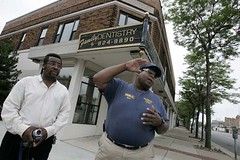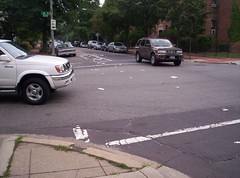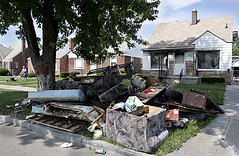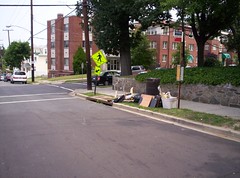Detroit neighborhood demonstrates that "Broken windows" theory + "community efficacy" = success
 Ankur Dholakia / The Detroit News. Keith Hines, left, and James "Jack Rabbit" Jackson, leaders of the Jefferson Chalmers Neighborhood Association, say that continuous home repairs, lawn care and hard work have led to the five-block area of Jefferson and Chalmers being named one of the most well-maintained neighborhoods in the area.
Ankur Dholakia / The Detroit News. Keith Hines, left, and James "Jack Rabbit" Jackson, leaders of the Jefferson Chalmers Neighborhood Association, say that continuous home repairs, lawn care and hard work have led to the five-block area of Jefferson and Chalmers being named one of the most well-maintained neighborhoods in the area. The Detroit News article, "Neighborhood bucks urban blight: Chalmers, Jefferson's well-maintained homes, lawns in Detroit honored for fifth-straight year," demonstrates something that I've believed for a long time. If you want to stabilize or improve your neighborhood, expecting other people to do it for you is a strategy that isn't going to work.
 Street condition after garbage pickup by DPW workers at 6th and A Streets SE, Washington, DC.
Street condition after garbage pickup by DPW workers at 6th and A Streets SE, Washington, DC.Too many people expect "the government" to take care of things when the kind of places we want to live in require way more "tender loving care" than the average government employee is likely to give. There are dedicated workers, but there are many who are just getting a paycheck.
A few weeks ago I had an e-conversation with WMATA about the (lack of) cleanliness on subway cars (pre-digital camera...). I know why the cars are dirty, because for security reasons WMATA has removed trash cans and recycle bins from station platforms. As "Dr. Transit," and as a regular old resident-citizen, I care about public transit, so when I am on a subway car, I will pick up the newspapers strewn all over the car, and deposit them in a recycle bin when I leave the station.
The last time I did this, I was picking up trash all around a WMATA employee, who exited the train at the Ivy City Maintenance Yard.
I complained about this and the response I got from WMATA Customer Service is that "workers aren't required to pick up trash." You don't think I know that? (Note to the Union representing WMATA employees, don't think I won't remember this the next time I read an article in the paper about contract negotiations and wage rates.)
But why employ someone who doesn't give a damn? If WMATA wants billions of dollars of financial support, it needs everyone who works for the organization to contribute to excellence. In these times of "zero sum" municipal finances, no organization can afford to carry employees who don't pull their weight. That's what I said in the email I sent in response, to which I copied Richard White and Stephen Feil... and as Phil Collins sang in the Genesis song "there's [been] no reply at all."
Anyway, I don't expect government employees making excuses like these to step up and take care of and/or clean up my city...
 This Detroit neighborhood likely wasn't in the running for the award garnered by the Chalmers Jefferson Neighborhood Association. (From "City residents feel grip of crime: Public safety is a key concern for voters as they get ready to cast ballots in mayoral primary.")
This Detroit neighborhood likely wasn't in the running for the award garnered by the Chalmers Jefferson Neighborhood Association. (From "City residents feel grip of crime: Public safety is a key concern for voters as they get ready to cast ballots in mayoral primary.") Street dumping on 12th Street NE in Brookland, Washington, DC.
Street dumping on 12th Street NE in Brookland, Washington, DC.For more on broken windows theory and community efficacy theory, see the entry "Urban health, nasty cities, broken windows and community efficacy" in the April archive.



0 Comments:
Post a Comment
<< Home